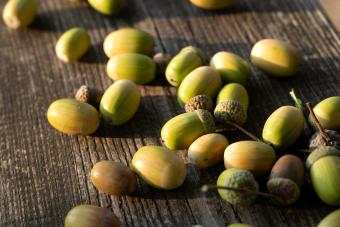
While on a walk or playing in the backyard, you might notice your dog gobble up a few acorns. Unfortunately, acorns are not safe for dogs; ingesting or chewing on them can lead to dangerous consequences. All dog owners should be aware of the dangers acorns pose and when it's vital to seek veterinary care.

Acorns Are Not Safe for Your Dog
Oak trees and their nuts, known as acorns, contain tannic acid or tannins, which are toxic to dogs. If ingested in small amounts, these tannins can cause symptoms of gastrointestinal upset, including vomiting, diarrhea, and inappetence. However, if a dog eats enough acorns, they could experience permanent kidney failure or even death.
These dense nuts are also dangerous because they can easily create a blockage in a dog's intestines, which typically require an invasive and expensive surgery to treat. Acorns can also pose as a choking hazard given their size and shape.
The good news is, the inside of raw acorns tastes bitter when the outer shell is broken, and most dogs won't find them appetizing after breaking through. However, you need to watch your dog to make sure they aren't chewing on acorns they find around the yard, or they might develop a taste for them and end up harming themselves in the process. To be safe, make sure your dog is not chewing on or swallowing raw acorns.
What to Do if Your Dog Ate Acorns
If you discover that your dog ate acorns, it's important to contact your veterinarian or call an animal poison service. The toxic dose of acorns depends on several factors, including your dog's size, their health condition, the number of nuts ingested, and the maturity of the acorns. Immature or green acorns have higher levels of tannins, making them more toxic than the brown, mature ones. Your vet can determine if the quantity of acorns ingested could put your dog at risk for poisoning, then take appropriate action to help them.

Symptoms of Acorn Poisoning
Clinical signs associated with acorn poisoning may present as early as a few hours after consumption or may take up to a week to appear, particularly if kidney damage is involved. Monitor your dog for the following symptoms.
- Excessive drooling
- Vomiting
- Diarrhea
- Inappetence
- Lethargy
- Abdominal discomfort
- Increased thirst/increased urination
- Kidney failure
When to Go to the Vet
It's recommended to phone your veterinarian and seek guidance as soon as you discover that your dog has eaten acorns. Should your pup develop any concerning and/or persistent symptoms, it's important to seek veterinary care. Acorn ingestion can lead to several dangerous conditions that all require treatment.

- Choking: Given the round size of an acorn, it's possible for a dog to choke on this nut. An acorn can become stuck in the esophagus or possibly inhaled into the trachea. This is a medical emergency which requires urgent intervention. Signs a dog is choking include pawing at their face or throat, gagging, coughing, distress, and collapse.
- Gastrointestinal upset: In smaller volumes, the toxin in acorns can cause an upset stomach. Dogs may develop nausea, vomiting, diarrhea, or inappetence. If these signs worsen or persist for more than 24 hours, see your vet.
- Foreign body obstruction: A single acorn in smaller dogs or a cluster of them can obstruct the intestines, leading to a blockage. Without the ability to move intestinal contents through the guts, dogs can essentially starve to death. It's also possible for the blockage to interfere with blood flow to the intestines, which can result in necrotic bowel.
- Renal failure: When ingested in large amounts, acorns can damage a dog's kidneys. The signs of organ injury may not appear until several days after acorn ingestion, although by this time the damage may be irreversible. Common signs of renal failure include increased thirst, increased urination, vomiting, and decreased appetite.
Prevent Acorn Toxicity
The best way to protect your dog from experiencing acorn toxicity is prevention. Rake up fallen acorns in your yard, avoid heavily forested areas heavy with acorns, and closely monitor your dog anytime they're off leash. If your dog does munch on one of these nuts, seek guidance from your veterinarian to ensure the best outcome for your beloved pup.







